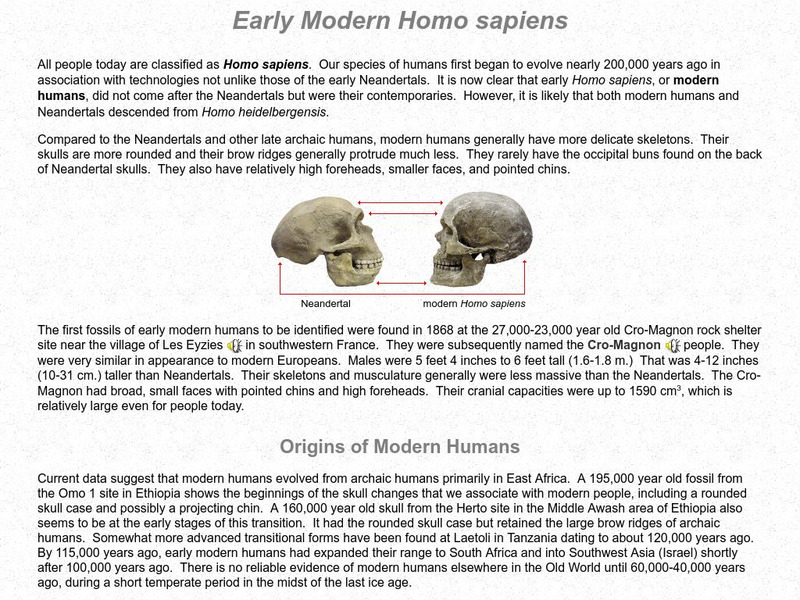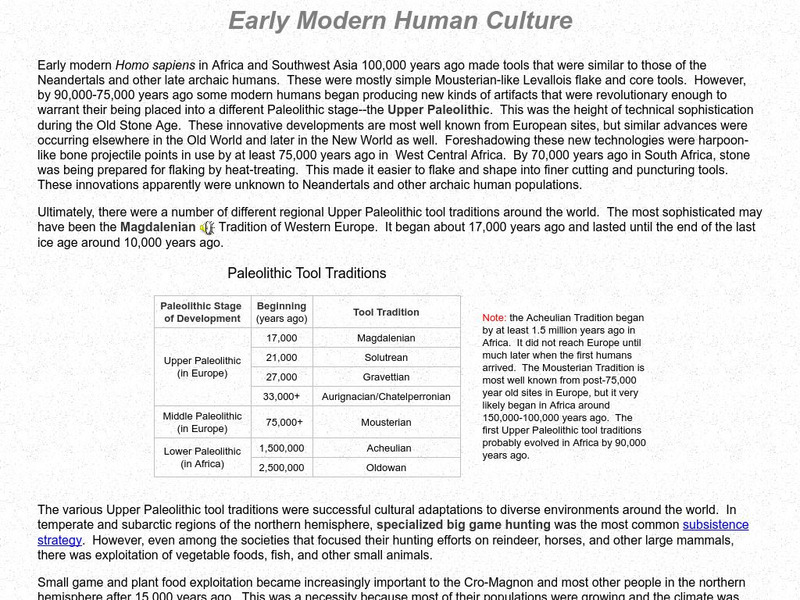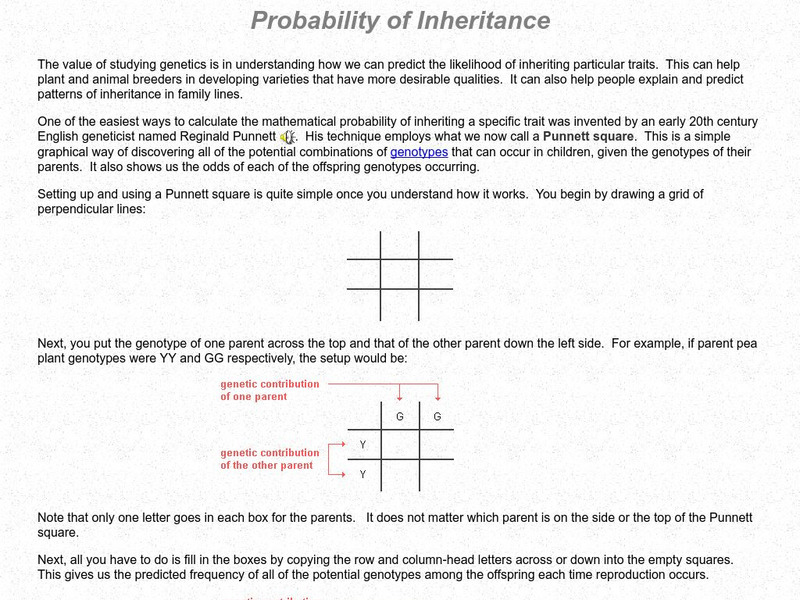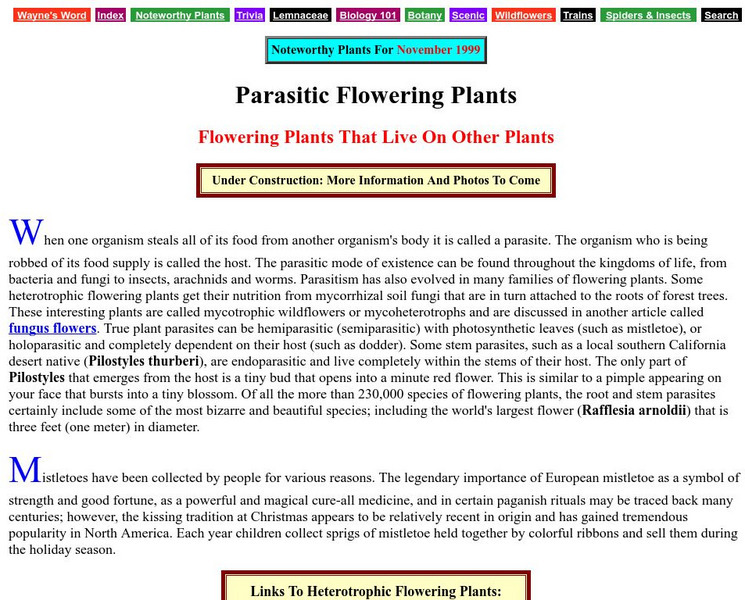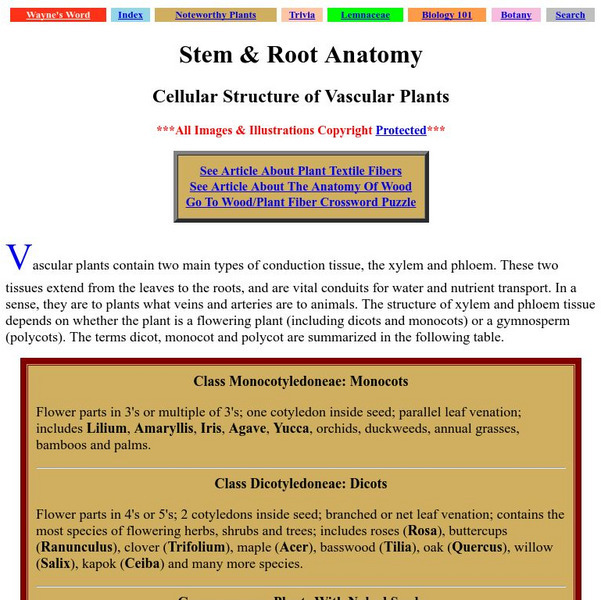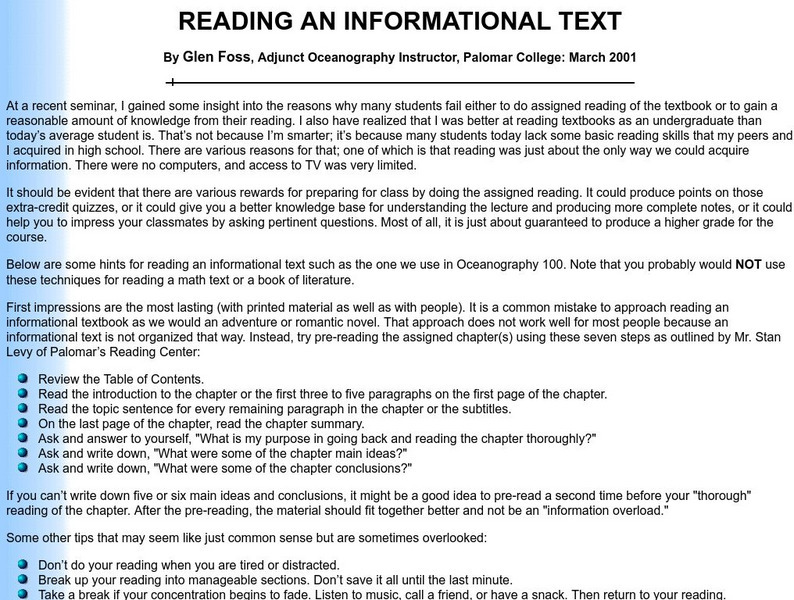Palomar Community College District
Palomar College: Flashcards: Early Modern Human Culture
A collection of fifteen flashcards testing knowledge of the early modern human culture.
Palomar Community College District
Palomar College: Early Modern Homo Sapiens
An easy-to-understand article traces the origins of modern humans through the use of a simple graph. Various models of migration are also discussed.
Palomar Community College District
Palomar College: Early Modern Human Culture
An exclusive group of early humans are classified into the Upper Paleolithic stage because they were more evolved than others. Discover their culture - art, tools for making tools, and social changes - of this era.
Palomar Community College District
Probability of Inheritance
A great supplement to help introduce Punnett Squares. It tells how to set them up and how to use them correctly. A sample quiz is offered and feedback is given to help with understanding why an answer is correct or not.
Palomar Community College District
Palomar College: Practice Quiz for Mendelian Genetics
This site from Palomar College provides an online practice quiz includes history as well as some of the genetics. Includes feedback. A great learning and practice site.
Palomar Community College District
Palomar College: Lesson 1: Production Costs
This lesson provides a good outline for a unit on the study of "production costs". Charts and graphs are provided to help understand a firm's cost curves, and at what level of production they should produce.
Palomar Community College District
Major Biomes of North America
A good review of basic terminology followed by descriptions and pictures of the North American biomes.
Palomar Community College District
Wayne's Word: Carnivorous Plants
This site from Wayne's Word provides an excellent review of the world of carnivorous plants. Many photographs support the somewhat detailed text.
Palomar Community College District
Wayne's Word: Biology and Botany Crossword Puzzles
Try these puzzles as a review for quizzes and tests. There are interactive versions that are fun to try while on-line as well as printable versions. Puzzles cover a wide variety of general biology plus more specific ones on botany.
Palomar Community College District
Wayne's Word: Economic/medicinal Plants
A fascinating site with information on a variety of of plants that produce compounds that affect the heart, brain and cancer tumors.
Palomar Community College District
Wayne's Word: Watermelon Snow Caused by Green Algal Cell
At this site from Wayne's Word, you can check out the pictures of snow banks stained with what looks like watermelon juice! This is a thorough exploration of algae responsible for this phenomenon.
Palomar Community College District
Palomar College: Parasitic Flowering Plants
The ecology and natural history of plants that live at the expense of other organisms is described in detail at this site from the Palomar College. Great material for a report or presentation.
Palomar Community College District
Palomar College: Stem & Root Anatomy
This is an advanced review from Palomar College of the types of cells that make up conducting tissue in stems and roots. The photos and diagrams are excellent!
Palomar Community College District
Wayne's Word: Chile Peppers and Other Pepper Trivia
This article from Wayne's Word provides a fun and fascinating look at the world of peppers. You can learn about the many different types and uses of peppers.
Palomar Community College District
Palomar Community College: Behavioral Science Statistics: Class Intervals
A sample problem on creating intervals for a frequency distribution. The example is worked out and explained along the way.
Palomar Community College District
Palomar College: Behavioral Science Statistics: Frequency Histogram an Example
A step-by-step worked problem demonstrating how to take a set of data and produce a frequency histogram. Hints are provided along the way and the final graph is shown for the user to check.
Palomar Community College District
Palomar College: Behavioral Science Statistics: Cumulative Percent Polygon
A step-by-step worked problem demonstrating how to take a set of data and produce a cumulative percent polygon. Hints are provided along the way, and the final graph is shown for the user to check.
Palomar Community College District
Behavioral Science Stats: Grouped Frequency Distribution
A sample problem that utilizes frequency distributions to find the frequency, relative frequency, intervals and cumulative relative frequencies for the given problem. The example is worked through step-by-step with a great explanation...
Palomar Community College District
Palomar College: Reading an Informational Text
Glenn Foss, an instructor at Palomar College, discusses some possible reasons why students have problems reading and recalling textbook material. Provides an outline for seven steps of effectively reading assigned material.
Palomar Community College District
Palomar College: Frequency Polygon an Example
A step-by-step worked problem demonstrating how to take a set of data and produce a frequency polygon. Hints are provided along the way and the final graph is shown for the user to check.
Palomar Community College District
Study Guide: Movements in Twentieth Century Art After World War Ii
This resource offers a study guide on the movements in twentieth-century art after World War II, including abstract expressionism, op art, pop art, minimalism, conceptual art, performance art, photorealism, earth art, neo-expressionism,...
Palomar Community College District
Palomar College: Columbian Exchange
A page on the elements of the Exchange that made the most significant impact. Clicking on the item brings up a page of explanation.
Palomar Community College District
Palomar College: Situational Leadership Ii
This site focuses on Ken Blanchard's theory known as situational leadership II.
Palomar Community College District
Palomar College: Mode, Median, Mean Examples
A series of step-by-step worked problems demonstrating how to take a set of data and produce the measures of central tendency. Hints are provided along the way and the final measures are shown for the user to check.



